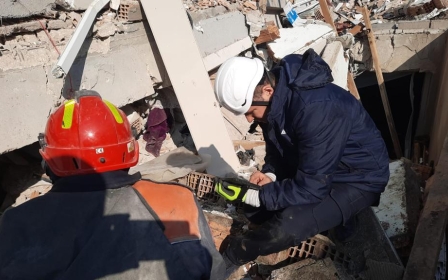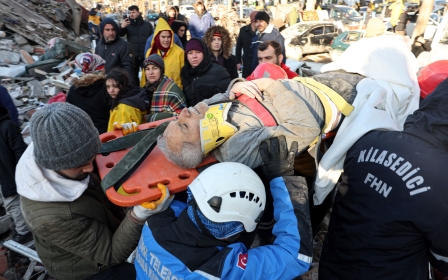Syria earthquake: EU signals it is ready to work with Assad government on aid

The European Union is asking member states to “respond favourably” to an official plea from the Syrian government, following an earthquake that left more than 11,000 people dead across Syria and Turkey.
Damascus made an official plea to the European Union for help on Wednesday.
“Earlier today, this morning, we have received a request from the government of Syria for assistance through the civil protection mechanism," Janez Lenarcic, European Commissioner for crisis management, told reporters.
The European Union was swift to dispatch rescue teams to Turkey after the massive earthquakes struck the country on Monday, close to the border with Syria.
But it initially offered only minimal assistance to Syria through existing humanitarian programmes because of EU sanctions imposed since 2011 on the government of President Bashar al-Assad. The sanctions were in response to his brutal crackdown on protesters, which spiralled into a civil war.
The US has ruled out working with Syria and has not indicated a change in its sanctions policy.
Ned Price, the US State Department spokesman, said in a briefing on Monday that Washington was sending aid to Syria through “a different process” than it was to Turkey, a Nato ally.
In Turkey "we have a partner in the government; in Syria, we have a partner in the form of NGOs on the ground who are providing humanitarian support,” he said.
Comments from senior EU officials on Wednesday, however, indicated the potential for a substantial shift in the bloc's dealings with Damascus as the scale of the catastrophe grows.
'No one left out'
"We are now racing against the clock to save lives together. Soon we will provide relief aid, together. Turkiye and Syria can count on the EU," Ursula von der Leyen, president of the European Commission, wrote on Twitter.
"No one should be left alone when a tragedy like this hits a people," von der Leyen said in a statement.
The EU plans to host a donors conference in March to mobilise international aid for Syria and Turkey, von der Leyen said Wednesday.
The event will aim to coordinate the international response to the disaster and "will be open to EU Member States, neighbouring countries, UN members and international lenders, the bloc said.
Turkey's Foreign Minister Mevlut Cavusoglu said the country is working on opening two more border gates to Syria to enable the flow of humanitarian aid to its earthquake-hit neighbour.
Cavusoglu said damage on the Syrian side of the road leading to the Cilvegozu border gate, which is solely open for humanitarian aid as part of UN Security Council authorisation, is causing difficulties in responding to the disaster.
The quake struck the last bastions of rebel-controlled northwest Syria, but also government-controlled areas like Aleppo.
On Wednesday, the UN's resident Syria coordinator, El-Mostafa Benlamlih, said the damage in government-held areas of Syria is "huge".
"We need the support of all interested parties to facilitate access, be it to the northwest of Syria or to the rest of Syria, because there also, they are suffering,” he said.
Some organisations, including the Damascus-based Syrian Arab Red Crescent, have called for sanctions to be lifted on the Syrian government to better facilitate aid.
Amany Qaddour, from Syria Relief and Development, told Middle East Eye on Tuesday that the international community was being “extremely flexible” in terms of processes related to sanctions, so as to ensure aid was being delivered, but said the damage from the quakes had added new logistical complications.
Qaddour also said that her aid workers based in southern Turkey had been left “incapacitated” by the quake.
Middle East Eye delivers independent and unrivalled coverage and analysis of the Middle East, North Africa and beyond. To learn more about republishing this content and the associated fees, please fill out this form. More about MEE can be found here.






